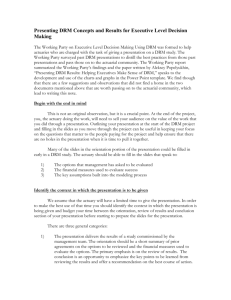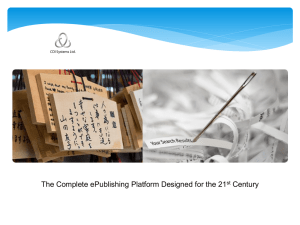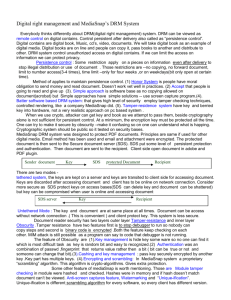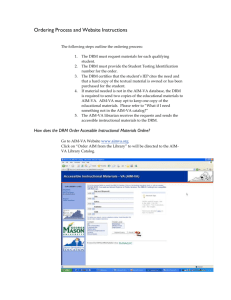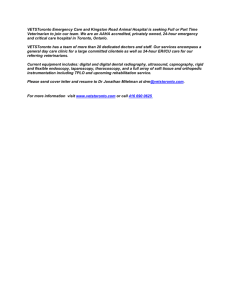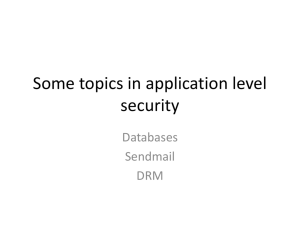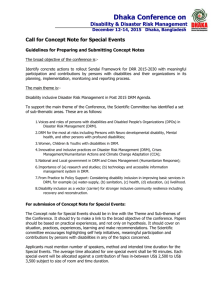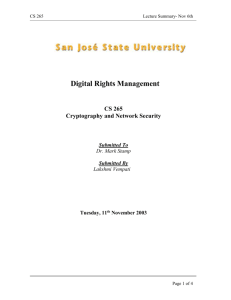day 22
advertisement
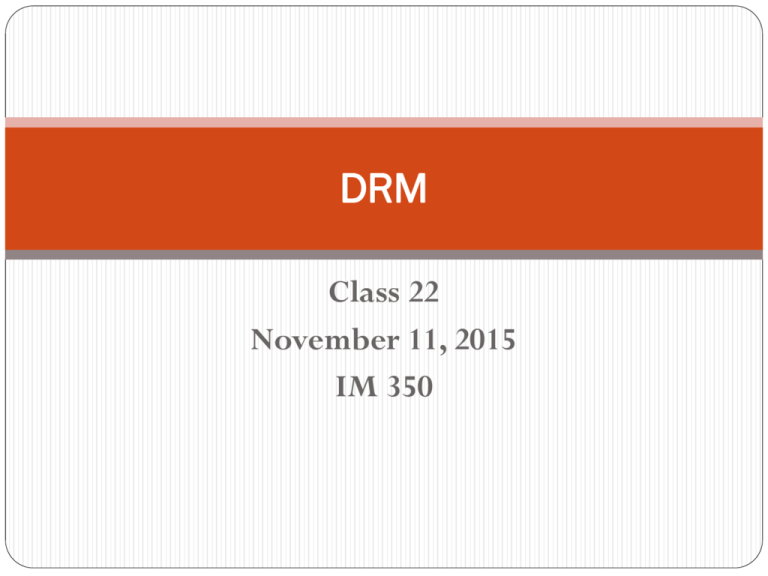
DRM Class 22 November 11, 2015 IM 350 I am here and “clicker-ready” A. True B. False The “DRAFT” watermark that can be made to appear on a WORD file is an instance of A. Control on the physical layer. B. Control on the code layer. C. Control on the content layer. D. None of the above. 60 1201(a)(1) ACTS: no breaking access controls; 1201(a)(2) TOOLS: no selling tools to break access 60 controls; 1201(b) TOOLS: no selling tools to break copy controls means that A. Legal copying is still legal. B. This section of the act does not forbid copying. C. a. & b. D. None of the above. Triennial rulemaking for the DMCA is carried out by A. House Judiciary Committee B. Commerce Department C. Office of the Copyright Czar D. Registrar of Copyrights 60 Steve Jobs came to the conclusion that, essentially, DRM does not work. 30 A. True B. False 60 Opponents of baking DRM into HTLM5. A. have, generally, found that “resistance is futile.” B. opposed using an open source solution for DRM. C. are in opposition to Encrypted Media Extensions (EME) as part of HTML5 standards. D. All of the above. 60 “Speedbump” limitations are A. Light-weight constraints. B. Medium-weight constraints. C. Strong constraints. Open Digital Rights Language (ODRL) and Extensible Rights Markup Language (XrML) can be used to identify and declare usage rights. A. True B. False 30 drm technological protection measures (TPM), also called Digital Rights Management (DRM). DRM are technologies that enforce a restriction on the use of content. “rights management” “digital restrictions management” “digital handcuffs “It is law protecting software code protecting copyright” (Lessig, “Jail Time in the Digital Age”). Ugly but telling example in 2009 that brought DRM into the headlines Orwell, Kindle, and Amazon In a move that angered customers and generated waves of online pique, Amazon remotely deleted some digital editions of the books from the Kindle devices of readers who had bought them. An Amazon spokesman, Drew Herdener, said in an email message that the books were added to the Kindle store by a company that did not have rights to them, using a selfservice function. “When we were notified of this by the rights holder, we removed the illegal copies from our systems and from customers’ devices, and refunded customers,” he said. Amazon effectively acknowledged that the deletions were a bad idea. “We are changing our systems so that in the future we will not remove books from customers’ devices in these circumstances,” Mr. Herdener said. Additional troublesome issues/instances License v. Sale (for example, of software): First Sale Doctrine doesn’t apply The 9th circuit reconciled a series of prior panel rulings deemed inconsistent by the lower court, and ruled that proposed resales of packaged software via an eBay auction were not protected by the copyright first sale doctrine because the initial transaction between the software developer and its transferee was a license, not a sale. Additional troublesome issues/instances Who owns the copyright on a copy is also not always clear. the case of the software on a chip on a smartphone that I “purchase” In her recommendations to the Librarian of Congress, the Register of Copyrights declined to resolve the question of ownership, stating that the law on ownership of computer programs is “in a state of flux,” and “unclear” and that as a result, she was unable to determine whether owners of smartphones are also the owners of the copies of computer programs on the devices. Additional troublesome issues/instances Big Content wants DRM controls on music to work forever We reject the view," he (Steven Metalitz, the Washington DC lawyer who represents the MPAA, RIAA, and other rightsholders before the Copyright Office) writes in a letter to the top legal advisor at the Copyright Office, "that copyright owners and their licensees are required to provide consumers with perpetual access to creative works. No other product or service providers are held to such lofty standards. No one expects computers or other electronics devices to work properly in perpetuity, and there is no reason that any particular mode of distributing copyrighted works should be required to do so." Additional troublesome issues/instances Wii U won't play games from other regions Diehard fans of imported games had better be prepared to buy multiple international editions of the Wii U if they want to play every game available for the system worldwide. Following an off-handed mention in a translated report from Japanese gaming magazine Famitsu, Nintendo has now confirmed to CVG that its upcoming system will be region locked, meaning that Wii U games will only work on hardware sold in the same region. Additional troublesome issues/instances Logo, Copyright Notice and Link on Web Site Constitute "Copyright Management Information" under DMCA the court in Cable v. Agence France Presse took the plain language approach, concluding that the plaintiff ’s name and the link on the Web site constitute copyright management information within the scope of 17 U.S.C. § 1202: Likewise, the Seventh Circuit has stated that “‘[s]tatutory interpretation begins with the plain language of the statute,’” U.S. v. Ye, 588 F.3d 411, 414-15 (7th Cir. 2009) . . . the plaintiff ’s name and hotlink fall within the scope of “copyright management information,” in the absence of evidence to the contrary, which may be considered in the context of future dispositive motions, the court denies the motion to dismiss this claim. Additional troublesome issues/instances Court: breaking DRM for a "fair use" is legal A federal appeals court has just ruled that breaking through a digital security system to access software doesn't trigger the "anti-circumvention" provisions of the Digital Millennium Copyright Act. Court rules copying your own DVD’s is illegal A federal court has found a DVD copying company’s software violates U.S. copyright law. What is more, the court held copying DVD’s (including ones you’ve purchased and legally own) is illegal. Additional troublesome issues/instances Microsoft Reverses (Another) Anti-User Xbox One Policy A Microsoft executive has confirmed that, contrary to earlier reports from the company, the upcoming Xbox One console will not require the Kinect sensor to be activated at all times after all. This change comes after a widespread backlash from gamers concerned about the privacy implications of an always-on camera pointed from the television back at the couch. Additional troublesome issues/instances Invasion of Privacy? Jay-Z’s App wants to Know who You’re Calling As previously reported Jay-Z and Samsung partnered to have his latest project “Magna Carta Holy Grail” available to Galaxy S3 & S4 smartphone owners via an exclusive app three days before it’s official release. But now, according to a privacy group, too much information was required in order to retrieve the giveaway. The complaint to the Federal Trade Commission (FTC), filed by the Electronic Privacy Information Center (EPIC), states that the mobile app “collects massive amounts of personal information from users, including location data and data pulled from other accounts and other apps on the users phones.” Additionally, EPIC’s summary of the complaint adds, the app “also includes hidden spam techniques that force users to promote the album.” The users are required to allow the app to access their location as well as view their call logs, email addresses, social media accounts among other things. The app also requires used to access their Facebook or Twitter account to download it and then they have to make social media posts to “unlock” song lyrics. The app actually serves no purpose after the users are able to download the album, so EPIC views the need for so much information as excessive. Additional troublesome issues/instances DRM in Cars Will Drive Consumers Crazy Forget extra cupholders or power windows: the new Renault Zoe comes with a "feature" that absolutely nobody wants. Instead of selling consumers a complete car that they can use, repair, and upgrade as they see fit, Renault has opted to lock purchasers into a rental contract with a battery manufacturer and enforce that contract with digital rights management (DRM) restrictions that can remotely prevent the battery from charging at all. who’s digital rights managed? the IP ownership rights of the legal rights owner the schemes don’t (generally) protect the digital rights of users. They could do so. Big content holders say that the measures protect consumers from breaking the law without knowing it, and/or dissuade them from trying--as they might if doing so were easy. In other words, protecting ourselves from, ourselves, and protecting content by making piracy more difficult. strength of control/applied to what functions? Strong (end-to-end enforcement) everything you have to the single allowed use. (dvd) moderate only some aspects of the thing you have, to single uses (e.g., downloaded movies--free watching, no copying/transfer) everything you have to multiple allowed uses (e.g., downloaded music) Weak (speedbump) not everything you have and only in some uses (version file conversions; watermarks, music over home networks, etc.) places/ways to exert control the physical layer The file/cd/dvd will not engage with/in certain devices During the “last mile” in a fiber system, a switch on the relay could control access to wireless service log on technologies of many sorts that engage physical devices (card swipes and the like) net neutrality restrictions enacted via monitoring and bandwidth adjustments the code layer Encryption proprietary platforms Within the standards (Encrypted Media Extensions (EME)) the content layer “traditional” DRM speed bumps (notices, contract restrictions, etc.) watermarks flags Acts vs. Tools 1201(a)(1) ACTS: no breaking access controls; 1201(a)(2) TOOLS: no selling tools to break access controls; 1201(b) TOOLS: no selling tools to break copy controls. “No copying” . . . Is left out . . . In effect, protecting legal copying Acts vs. Tools a new type of works protections that have little or nothing to do with the traditionally protected rights of the copyright holder (David Nimmer). This creates a somewhat strange and paradoxical situation: one may be prohibited from defeating technical protection measures that protect access, but once access has lawfully been gained, whether or not further protection measures may be defeated is subject to evaluation of the traditional and technology-neutral existing exemptions within copyright law: “Nothing in this section shall affect rights, remedies, limitations, or defenses to copyright infringement, including fair use, under this title” (17 U.S.C. sec. 1201(c)(1)). Triennial DMCA Rulemaking Is not a very efficient process Maybe is better than nothing Sometimes makes hardly ANY sense DRM looks silly In hassles over phones In the case of the cell phone unlocking, the 2012 rule actually cut back on a previously granted exception: in both 2006 and 2009 the Register of copyrights had permitted cell phone handset unlocking in order to switch carriers, but by 2012, she felt that opponents had demonstrated that market forces had produced many more alternatives to circumvention and the exception was no longer needed. DRM looks silly In hassles over phones The 2012 rule only allowed unlocking for handsets sold within 90 days of the rule’s issuance. A public uproar ensued and led to an online petition (at the White House website) that reached the qualifying threshold for administration attention. Legislation soon followed and in August, 2014, President Obama signed a bill restoring consumers’ rights to unlock mobile handsets Not long after the failure to renew the exemption was fully in place. In January, 2013, a petition at whitehouse.gov zoomed past 100,000 signatures, thereby crossing the mandated thresholds for administration attention (“Make Unlocking”). Soon thereafter, the Obama administration called for a return of the exemption and by September, 2013, the Department of Commerce began examining mandating a return to the exemption (Mullin, March 4, 2013; Farivar, Sept. 17, 2013). None of this action appears closely related to the intent of Congress to use the DMCA’s anti-circumvention language as a way to combat copyright infringement via piracy. in this corner: Pro-drm if you don’t lock it up, they'll steal it. user rights? we (the content owners) think users have way fewer rights than they think they do or than they actually do. Digital files can be protected (sort of) DRM is strongly supported by the DMCA and further extension of it is hotly pursued by big media AND big software. loads of folks zero in here with the need for the lock down, ways to do it, and money to be made by doing it. Most large, corporate, holders of protected content, and many digital enterprises, advocate strong DRM. in this corner: con DRM locking stuff up is often an excessive intrusion on user rights. Don’t blame users for the lack of user law and don’t limit their rights because of that void rootkit fiasco . . . generally, drm doesn’t work and often violates user rights neutral but true: No widely distributed DRM scheme has yet actually defeated determined users DeCSS (and other such schemes) unlock them DVD rip studio or others: the stuff is like mushrooms Apple gave up Even the feds are worried that DRM is often over done: FTC: We’ll “come calling” about deceptive DRM loads of folks are "agin it" Creative commons EFF <http://www.eff.org/issues/drm> ALA some of the battlegrounds downloaded music digital TV (digital everything) pay for services restrictions broadcast flag restrictions (still not fully implemented) interoperability restrictions implications of “total” cloud or subscription-provided computing (still lots of fights over how to provide wanted files… and/or storage space for “questionable” files) closing analog holes Status of cryptography research and information exchange (lots of pressure against even legitimate research and development… our spy guys want holes in the back door and that weakens the DRM and puts our companies at a disadvantage, globally. DRM in HTML5 is a still VERY hot topic DRM in HTML5 is a victory for the open Web, not a defeat Why the HTML5 Standard Fight Matters (EFF against it) HTML5 steps closer to baked-in DRM support Web Daddy Berners-Lee DRMs HTML5 into 2016 Support for “the playback of protected content”
